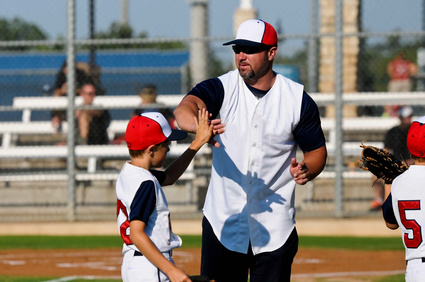A coach will impact more people in one year than the average person will in an entire lifetime. ~Billy Graham
From my earliest years, all I wanted to do was play baseball. I was fortunate enough to play baseball in high school and college. I’m a lawyer now, but on the side, I coach both baseball and fastpitch softball teams on which my kids play.
Having coached for many years, I now realize the sacrifice of the great coaching I received over the years. I’ve learned much from these coaches, and my faith has been profoundly influenced by Christian coaches. Sadly, the game “two truths and one lie” also shows I’ve made a lot of mistakes. Which of these two are truths, and which one is a lie?
- I’ve argued with an umpire not old enough to drive.
- I’ve thrown my own daughter out of a game and made her sit outside the fence.
- I’ve gotten in a heated exchange with an opposing coach who was in my Sunday school class (that I was teaching at the time).
Which two are true, and which one is false? Actually, all three are true.
I like to think that I’m on the other side of crazy coaching and overzealous sports parenting. At a minimum, I’ve tried to learn from my mistakes. Here are some lessons for coaches and every parent who coaches their kid between games, in the car, or from the stands. In other words, these are for all of us. First, even if we don’t coach our kids’ teams, we seek to protect our kids and ensure they are receiving sound instruction in a safe setting from coaches. Second, whether we are technically our kids “coach,” we inevitably coach them from the stands and off-the-field.
Take Coaching Seriously, But Not Too Seriously
Youth coaches tend to gravitate to two extremes: Tony La Russa wannabe or overly laid-back coach. As parents, be careful with coaches at either end of the spectrum. The Tony La Russa wannabe takes coaching too seriously. Maybe you’ve seen him—working over the umpires on every pitch, appealing every close play, getting in players’ faces. But the overly laid-back coach may not take coaching seriously enough. Even at early ages, parents expect coaches to be organized and know what they’re doing. Perhaps my hitting PowerPoint is overkill for eight-year-old boys, but teaching correct mechanics keeps kids and parents coming back when they see improvement. Other examples of a strong coach: organized practices, stations to maximize reps, learning coaching techniques from other coaches. Simply put, good coaching takes work (Col. 3:23), but it doesn’t require pretending you’re a professional.
Be Intentional About Defining Goals
Whatever the ages of your players, defining goals is critical. Team goals vary depending on the roster and the seriousness of the team. For early years, team goals should always focus on teaching fundamentals, including every player having a basic understanding of the rules of the game. For more serious teams, goals may include winning a league championship. There is nothing wrong with this as a goal. But if it’s the only goal, it’s very shortsighted. For every age group and every team, one goal should be inspiring as many players as reasonably possible to love and stick with the game. Can this be done for every single player? Maybe not. But in far too many cases, coaches are running off good players by demanding too much of them. The same is true for parents. Sports can be a fantastic outlet for stress. Don’t make it a stressor for your children.
Coach Boys and Girls (Much) Differently
A fellow coach told me years ago: “Boys have to play well to feel good about themselves; girls have to feel good about themselves to play well.” This statement is so profound that it should not only impact how you coach each gender, but how you raise your kids. For example, coaching boys could involve this challenge: “You see that team over there. They’re one of the best teams in the region. You go out there and show them what Texas baseball looks like.” This challenge may work for boys, who thrive on being challenged. In contrast, I once saw a similar pre-game speech with girls result in a wide-eyed, fearful look in their eyes. The game was over before it started.
Coach Them Up For Life, Not Just For The Field
Great leaders inspire and empathize with those they lead. Yet far too many coaches simply demand performance, then threaten what will happen if players don’t perform. This is a poor leadership style, whether on the field or in business.
First, great leaders inspire. Inspiring players starts with leading by example as a coach and parent (See “2 truths and 1 lie” above—ouch!). Inspiring players also means teaching them more than the sport by helping them grow as people as much as players. As a Christian, biblical lessons are easily taught from on-the-field experiences. For example, suffering losses or enduring hardships can make us stronger (Rom. 5:1–5). Other life lessons also flow naturally from sports. I frequently tell players to “control controllables,” teaching them that they can control effort and attitude. What they can’t control is the umpire or the other teams’ notions of fairness. Explaining to them that this is not simply a lesson for sports, but a lesson for life, is invaluable. Everything doesn’t always go our way. Not everyone will treat us fairly. But when things don’t go our way or we’re treated unfairly, we can control our effort and attitude. This should be a constant teaching point for coaches and parents.
Second, great leaders empathize. Empathy requires getting to know our players and what’s going on with them, then coaching them accordingly. It’s not easy to empathize. But when done well, you not only help players maximize their ability, you also positively impact them beyond sports.
If you truly want to inspire and make a difference to players as a coach (and parent), teach the game well, but don’t stop there. Also teach sportsmanship: humility, integrity, kindness. Teaching boys and girls to fight hard and fairly during the game, and shake hands and praise God at the end (regardless of the outcome), is not merely a sports lesson. It’s a life lesson:
“An athlete is not crowned unless he competes according to the rules” (2 Tim. 2:5)
“Every athlete exercises self-control in all things” (2 Cor. 9:25a).





